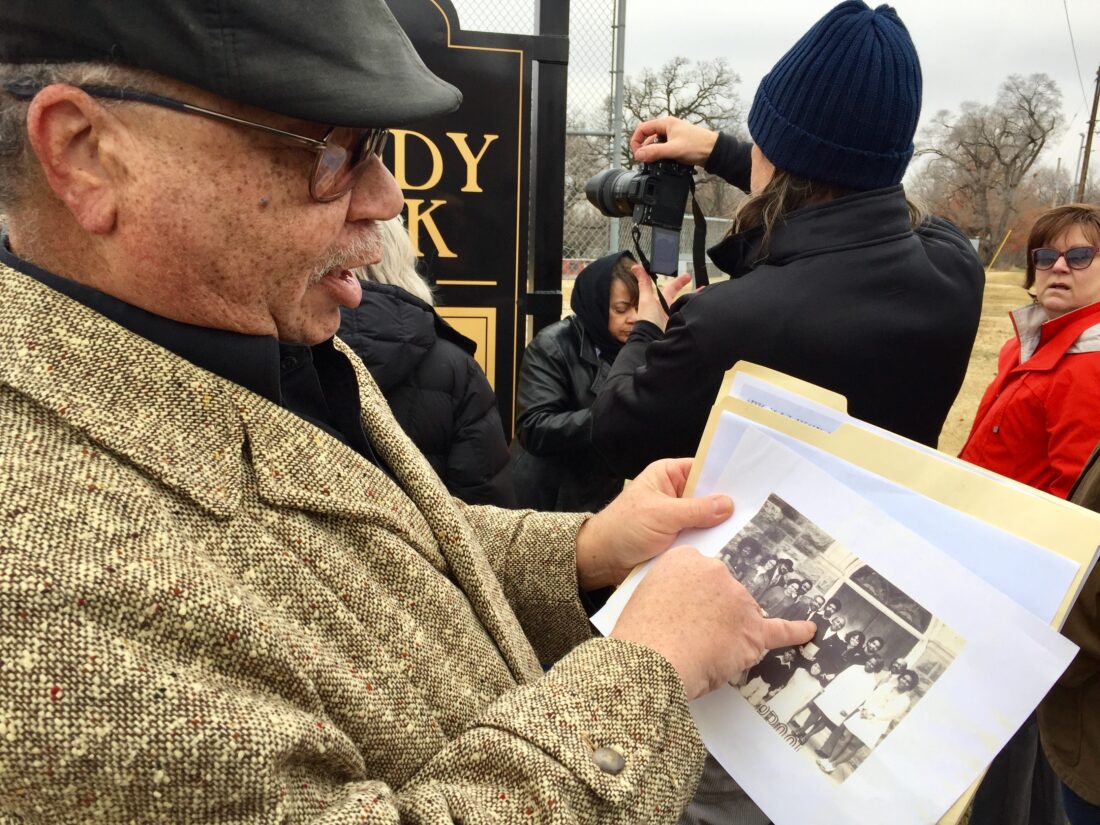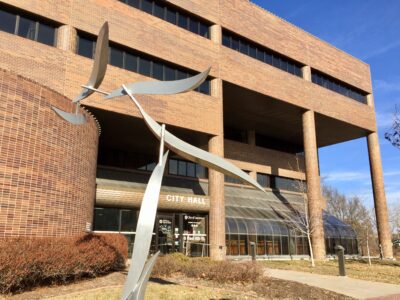‘The only park where they could really play’: New sign honors Elgin Woody’s baseball league for Black youth

photo by: Rochelle Valverde/Journal-World
Local leaders and members of the Woody family help unveil a new sign for Woody Park, 201 Maine St.
The ball diamond where Elgin Woody organized baseball and softball leagues for Lawrence’s Black youth and other kids of color is still the main feature of the park that bears his name and, now, visitors will also know his story.
Woody organized the league beginning in 1936, a time when there were not leagues that allowed Black youth to play. The City of Lawrence on Friday dedicated a sign at Woody Park, 201 Maine St., that tells that history on what would have been Woody’s 134th birthday.
There to mark the occasion was Bill Woody Jr., Woody’s grandson, who said his grandfather coached those who were excluded, whom he referred to as his “youngsters.”
“It was the only park where they could really play,” Bill Woody said. “My grandfather, he didn’t care what you were — Black, white, Mexican — he coached you. You were his ‘youngster,’ and he coached you.”

photo by: Rochelle Valverde/Journal-World
Bill Woody Jr. points out his grandfather, Elgin Woody, in a family photograph.
Reading from a newsletter that interviewed his grandfather, Bill Woody relayed that originally the ball diamond was right along Maine Street and that beyond the diamond the park had a downward slope, leaving left field and center field lower than the rest. So the first thing Woody did was bring in a crew to add “many loads” of dirt to the site to make it level, before moving the ball diamond further into the park.
“In its early days, the park didn’t have much love,” Bill Woody said. “The city didn’t put a lot of money into it, and my grandpa came along and literally built the park.”
For the next 38 years Woody ran the baseball and softball leagues in the park, which at the time was known as Lincoln Park. Bill Woody read from rules for the league that his grandfather wrote, which included having good team sportsmanship, wearing team shirts for all games and showing respect to the umpire. He said his grandfather was known as “the mayor” of Lincoln Park, and in 1973 the city renamed the park Woody Park in his honor.
“He was known as the Mayor of Lincoln Park for years, almost 40 years,” Bill Woody said.
More than 50 people gathered on Friday for the unveiling of the park’s new sign, including city and county leaders and a dozen members of the Woody family. Speakers included Parks and Recreation Director Derek Rogers, Vice Mayor Bart Littlejohn and City Commissioner Amber Sellers.

photo by: Rochelle Valverde/Journal-World
Lawrence Vice Mayor Bart Littlejohn speaks at an event to dedicate a new sign for Woody Park, 201 Maine St. Members of the Woody family are pictured at right.
Littlejohn, who lives in the nearby Pinkney neighborhood, said the neighborhood has a rich history of Black residents who made significant contributions to the community, and Woody was among them. Littlejohn said the rededication of the park was personal, because being someone who played baseball growing up, he would have been among those in Woody’s league had he played a couple of generations earlier. He said running the league showed the care and dedication Woody had for the community.
“Those are the kinds of things that can make people better and do even more than they even thought they could do, and I think that’s what Mr. Woody was about,” Littlejohn said.
Sellers said the rededication was a full-circle moment for her. She said she first read about the Lawrence league at the Negro Leagues Baseball Museum four years ago, in an exhibit that said lighted night games had their roots in Lawrence.
“That’s big, that’s history — that’s our history,” Sellers said.
Sellers said the sign represented a small token on behalf of the city, but was an important reminder for the community.
“We will not be better as a community until we remember where we came from,” Sellers said. “This is one way of reminding us where we came from, so we can be better about what we do moving forward.”

photo by: Rochelle Valverde/Journal-World
The new sign for Woody Park tells the history of the league that Elgin Woody oversaw.
The park’s new sign states that Woody helped maintain the 4-acre site and organize athletic events when recreational facilities for African-Americans were limited. He helped organize the teams, known as Woody’s Aces, for 38 years, beginning in 1936 and ending in 1973. He died five years later, in 1978.
Following the ceremony, Bill Woody said he wanted to ensure that that park and at a minimum the ball diamond — which is now surrounded by medical and health facilities, including the county’s new treatment and recovery campus — remained in place. He said the new sign for the park was “more worthy” than the small wooden sign that previously marked the park, and he hoped to see the park memorialized in perpetuity.
“It’s important that this park remains here,” he said. “I don’t care what happens in the neighborhood as far as growth, whatever — this park needs to remain in some form or fashion.”






COMMENTS